“Beyond The Actual” - And clear into the absurd (Gavin’s words, not mine). A clothing store’s name.
“Don’t get wet cookies” - They’re worse than cooties. Student’s notebook cover art.
“I will something hard” - Oh, Jesus, I don’t want to know. More notebook cover art.
“Girls surface emotion” - ...Does not necessarily reflect what’s going on deep down. Sweater.
“Tiny dreams of human beings to pursue the beauty design by Omnibus” - I’m vaguely insulted by this strangely egotistical claim. Pencil case.
Now on to the photos.
Saw this guy at The Monk Saturday night. Great hat. I bought him a beer and he let me try it on. Now I just have to figure out how I got this strange rash on my head Sunday morning...
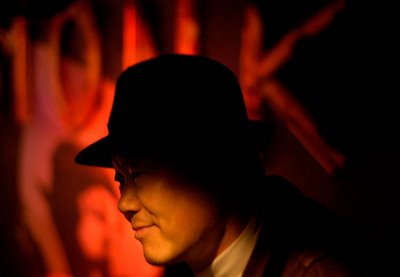
There is drinking too much, and then there is drinking until you pass out in a pile of dirt in Nampo-dong and soil yourself. Luckily, I have no first hand experience in this area. I just take pictures of those who do.
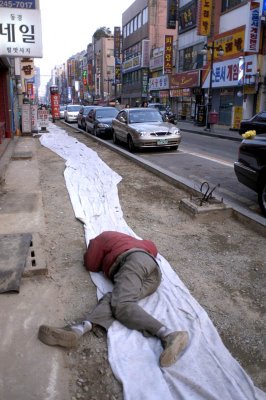
On the other hand, I can come up with other, equally creative ways of sacrificing my dignity such as playing a 300-won horse-racing game at an arcade near Jagalchi.
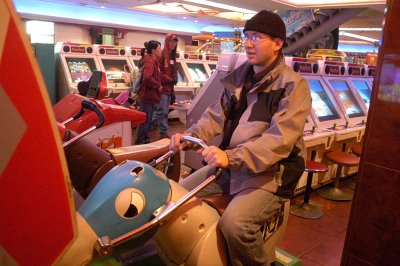
I went to the maritime university on Young-do this weekend. The whole university is on this tiny island a quarter mile from the main island of Young-do. It was cold. This fisherman on the breakwater was taking a break while students walked by to class.
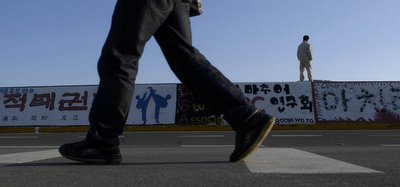
These two guys invaded my apartment last weekend to plug a hole in the water pipe conduit. They were an entertaining lot.
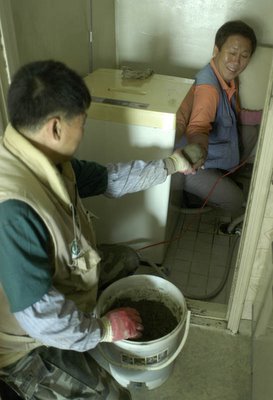
Street photography in Nampo after work.
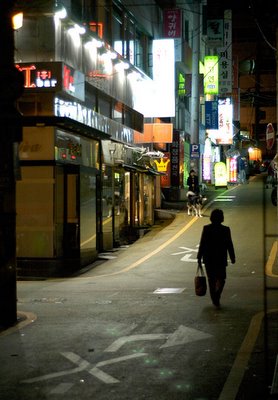
Students at the maritime university taking a break from their studies to play a little two-on-two.
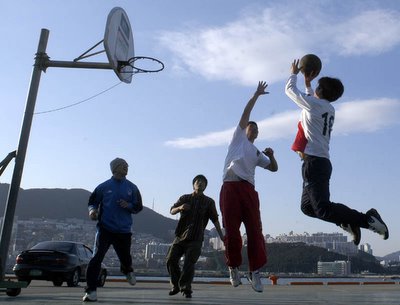
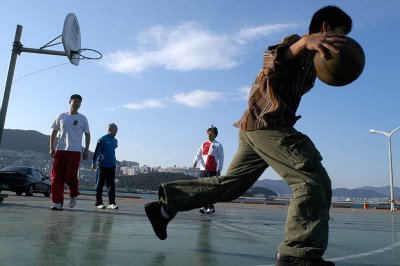
My 3A class drawing monsters and ghosts during reading day. Ji-hyeon has them first, and she makes them read the stupid book over and over again for 45 minutes. Mr. Jones don't play that. Usually I play 'reading book trivia,' but if they're just fedup with the reading book we draw monsters and ghosts for 45 minutes.
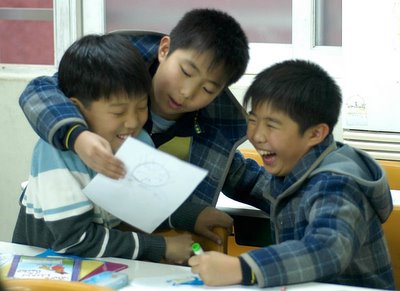
In-hye teaching the 1-2 auditorium class. I don't have a lot to do, so I take pictures.
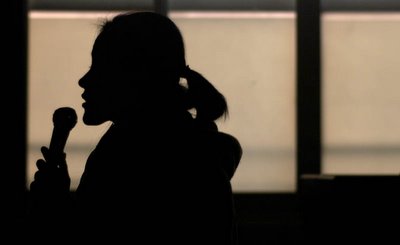
University students drinking soju and catching fish behind a beat-up wall along the pier on Young-do.
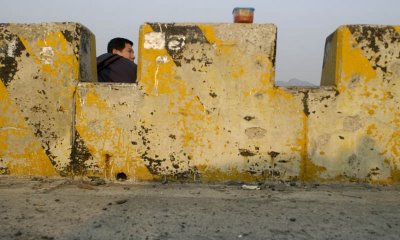
The weather took a turn for the worse this weekend. On Saturday night it threatened snow. The high school classes that meet on Saturday moved into the third floor classrooms(which have heaters). I finally bit the bullet and reluctantly bought one of the overpriced Chinese-made pullovers sold by the freezing denizens of the Nampo-dong clothing district. Ugh, I thought as I handed over 25,000 won for the 100 won cotton apparel (talked down from 30,000 no less).
Saturday morning I dragged myself out of bed and Gavin and I sleepily made our way to Busan station for our weekly Korean lesson. No sooner had we sat down than an ajumma placed a hangulized version of ‘Jingle Bells’ in front of us. Gavin and I exchanged surprised, amused looks.
During our 45-minute auditorium classes Gavin and I had been brought in to act as consultants to the Korean teachers as they taught the students how to sing cheerful American Christmas songs. I must have sang ‘Silver Bells’ at the top of my lungs two dozen times. Most of the eight-year-olds in the 1-2 Auditorium class did their best to sing along, but they just couldn’t put the words together fast enough to keep up with the music. Some hummed, others squawked, a few read in a monotone drone. Most of them simply moved their mouths and pretended to sing, hoping their silence would be lost in the cacophony. The end result sounded more like a group of out-of-key Yuletide zombies than a collection of children. We had quite a few laughs about it over dinner Friday night.
So it was altogether ironic when the tables were turned and in my hands was a version of a song I knew by heart in a language I knew in theory. The irony only increased when two young Korean men (probably the only two Koreans willing to sing in front of people in the whole building) got up in front of us and informed us (in Korean) of our impending doom: sing Jingle Bells - in Hangul.
Teacher, is that egg on your face?
I became my 1-2 students in that classroom as the Koreans struck up the music and began singing Jingle Bells. I mumbled. I stumbled. I mouthed the words without singing. Gavin tried to keep his composure as the whole room of foreigners massacred this most sacred of Western cows.
I got my own Korean teacher on Saturday, working on such helpful phrases as, ‘What does this mean?’ and ‘Pay attention.’ Watch out 2E2.
That night we accepted an invitation to have drinks with some people from Hangul Seodang. We took the subway to the Kaeungsundae University district and went to a bar called The Monk. Our normal mainstay, Ole’ 55 (named after a Tom Waites song), was closed. A sign on the door declared, ‘Some motherfucker called the police on us and shut us down. We’ll open back up next Friday.’
We walked down the flight of stairs to the muffled sound of a live jazz band below. The music was loud in the dark, confined bar. Gavin and I ordered a round of Cass (pretty much just repackaged Colt45) and found our friends: A newbie from Portugal named Felipa, an Italian lady named Laura and a witty Frenchman named Lawrence who had been living and working in Busan for the last nine years. They were as lively, inviting, and educated a group of people as any I had met in Busan. Good company.
Gavin brought up how Busan is like a giant mall, with stores everywhere you look. Felipa, who had lived in China with her parents for a lot of her childhood, said much of Asia is like that: Geared towards the small business owner, the takpokki stand, the guy with a bike and a box full of trinkets. I remarked upon how hard it was to drive in Busan, having recently acquired my motorcycle. It’s like they graduated from rickshaws to cars just yesterday. It was then that the Frenchman, Lawrence, gave me the QUOTE OF THE WEEK:
“There are four million people, but its a village,” he said, referring of course to Busan. Indeed, I thought. Big city, lots of people, but with a small town feel. People are still friendly here, they still care about one another. All of the businesses are customer focused and service-oriented, and there is a feeling of safety that other cities of this size just can’t provide.
On Sunday Gavin and I went down to the docks so Gavin could get a chance to ride the motorcycle I acquired from Julie when she departed Korea last Monday. A thirty-kilometer wind howled in our faces as we puttered down the mountain to the docks below.
Last week was testing week at ESS. Every month the Korean and native teachers test the students on the material covered over the last thirty days. The native teachers give a listening test in order to check the children’s comprehension of English and the Korean teachers test their considerable rote memorization capabilities with these freakishly long written examinations. Its a hectic time for all involved.
For my littlest kids I ask the simplest questions. How do you spell ‘cat?’ What color is this blackboard? As I progress up the ladder of ages and skill levels my tests...Remain about the same. There is an unofficial but tangible pressure from above to keep the children’s grades high. Gavin made the mistake of giving his students the grades they richly deserved. Flummoxed by their weak grasp of English, he brought the subject up in the teachers’ lounge between classes early in the week.
Mrs. Nam wasn't happy with the low grades awarded to the students. She turned around and icily informed Gavin that he could use at the student’s previous grades as a guide. She didn't come right out and ask him to change the grades, but her intention was understood. Obviously the low marks on the students’ papers were made in error and it was understood that Gavin’s corrections would be reflected in the roll books when she opened them on Wednesday. On the way home that night Gavin remarked, “well, now I know why they have a discipline problem.”
What interest do average teenagers have in applying themselves to their schoolwork when the threat of failing isn’t hanging over their heads? Why should they give me the time of day when I am absolutely impotent to alter their destinies? A precious minority of our students study English out of pure interest. I love those kids.
My impression of the majority of my students is that most of them view their time at ESS as a glorified study hall. Once or twice a day I find my middle school students using my instruction period to catch up on their homework or test preparation for ‘real’ school. I’ll spot a student seemingly emmersed by his or her English textbook and I’ll quietly make my way towards where they are sitting, expecting to smoke out a comic book or porno mag and instead being confronted with an algebra or biology textbook hiding behind ‘English Time Two.’
So it’s no surprise to me when students who have been attending ESS with high marks for six years can barely form a sentence of English. I craft my tests to reflect this bizarre manifestation of the school’s social disfunction and Mrs. Nam lavishes praise on me and my ‘brilliant’ students. I must be a truly great teacher, she says.
On one level I feel like the Benedict Arnold of the educational world, undermining the foundation of the relationship between student and instructor with my rotten tests. I should ask more of my students, I tell myself as I ask thirteen year olds to spell ‘ears.’ Then I remind myself of the realities of the hagwon system, that I am window dressing, a marketing ploy to pull in new customers. Heck, I’m not even qualified to be a teacher. I’m a journalist, for chrissake.
The only gift that I have to give these students is my voice. I use English every day. I am a native speaker. Only a few of the children actually recognize the massive opportunity this presents. I know them all on a first name basis: They pull me aside in the halls, or corner me in the teachers’ lounge, or walk me to my motorcycle after school; firing questions, working on pronunciation and perfecting their expression. Their hands are the first to shoot up into the air during class. They make me feel like I’m not just pulling a paycheck. I am a resource that would cost them tens of thousands of won per hour on a one-on-one basis, and I’m virtually free at ESS.
It is for these children that I do my best to be a teacher. I don’t hesitate to correct them, and I ask more of them than their peers. If the assignment calls for five sentences, I want ten from them, and I expect them to be long, complex and correct. They know it, too, and they always make me proud.
For the rest of the class, even the simplest tests are a major pain in the ass, and their mistakes are a wellspring of amusement for Gavin and I. This last round of testing brought a few laughs. One boy in my 2E2 class wrote a composition in which he turned himself into a phoenix. However, he pronounced ‘phoenix’ wrong, and you can guess how. The class was uncontrollable for the following fifteen minutes.
Oftentimes during tests I learn from my students’ compositions. The most frequently answered topic from this last round of testing concerned Korean history: What event in Korean history would you change and why? I formed the question after a long conversation with one of the Korean teachers, Soo-hee.
One hundred and five years ago or so the father of the king of Korea declared that outsiders from the West were to be barred from entering the country. His name was Hun-seon Daewonkun, and the foreigners heeded his wishes without complaint. They simply turned 180 degrees and brought their money and influence to the Japanese, who were more than happy to have it.
Five years later, the Japanese took their newfound power, firearms and political strength and used it to bend Korea to their will. Over the course of forty years the Japanese ruled Korea with an iron fist. They changed the Koreans’ names. They took their women to serve as prostitutes in the Japanese army during World War Two. They made it illegal to speak Hangul. They even tried to breed the Koreans out of existence by marriage and rape. Soo-hee, who recounted this horrific period of history, did not fault Hun-seon Daewonkun for his disastrous decision.
“He worried about the other culture’s values,” she said. “Korea was very powerful then, and he didn’t want to upset the balance of power.”
History is a touchy subject for many Koreans, though they are honored that I have an honest interest in the topic and never hesitate to fill me in. There are so many instances of wrong turns and misaligned fate in Korean history that I think they find their circumstances both fortunate and vaguely frustrating at the same time. On one hand they are one of the strongest, most stable economies in Asia; a powerhouse still soaring upward out of the ashes of the Korean War. On the other, Korea is a divided nation that has just recently begun to fulfill its potential. I feel that a palpable piece of their national identity is woven from the bitter threads of past disappointment.
Oftentimes this national heartbreak bleeds into the open through the unchecked wellspring of my students. A couple instances from last week stand out in my mind in particular. I was testing my Best Junior students by asking them write a composition on the aforementioned topic.
One of my best students, a young man stood in 3E1, stood and delivered his composition. In the early days of Korea, the country was divided into three powerful units; The Silla, Gogoryo, and Baekje kingdoms. The Silla dynasty, by far the smallest of the three in terms of land mass, decided to unite the three kingdoms. When the niceties of politics didn’t work, the feisty kingdom rolled up its sleeves, borrowed the entire Chinese army, and united the three kingdoms by force.
The problem was the Silla dynasty didn’t have the cash on hand to pay the Chinese for the rented muscle. The Silla were forced to give away half of all they won to the Chinese: What is now known as Mongolia. To put it another way, Korea could be twice as big today had the silly Silla monarchs not been so impatient, or so claimed my audibly annoyed 3E1 student. He loudly added at the end of his composition that had this not happened Korea would have been powerful enough later on in history to violently subjugate the Japanese instead of vice versa. Cute.
A few students stood up and discussed what they would tell a visitor from outer space about earth. One boy cranked up the creativity and pretended to be a tour guide. A few of the class punks begrudgingly gave the minimum five sentences on where they would travel in the world. Then my brightest student stood up and taught me another lesson in Korean history.
He said that if he could have been Hun-seon Daewonkun, he would have let the foreigners into Korea during those critical twilight years of the twentieth century. “Then we could have been more powerful than Japan and we could have subdued them and owned them instead of them...” he stopped short of finishing his sentence, a barely perceptible edge to his voice. His classmates all nodded their assent in silence.
For my high school students I had my fortune told by two different fortune tellers in Nampo-dong Friday night. I then played the recorded Korean fortunes back for my students and they translated them into English. Their fortunes were dismal. If what they say is true, I'll be a rich, lonely bachelor the rest of my life who is extremely happy with his job. Well, that's two out of three categories. That's probably a lot better than most people get in life. My students thought it was all BS. They thought I was handsome, even if I was balding like crazy, and that I'd be sure to land a stunning woman one day. To my credit, the fortune tellers had to guess what month and hour I was born because I didn't know the translation from English.
Gots to go. I'm tired, and I have to wake up early and hear a speech by Mr. Kim. You can bet I'll record it, and as soon as I find out how to post audio on this thing you'll hear his melodious voice. Good day to you all, and if any of you need a job teaching English in Korea, we have two openings at ESS. So come join your friend SoKoNotes in Korea. Believe me, you won't regret it. This place rocks. Peace. --Notes
2 comments:
Your stories are tempting.... if my whole world falls apart in the next 3 weeks, I'll ask ya how to apply. I'm actually applying for the full-time long-term sub position at the school next semester, if I get it, I'll quit my other job as a med secy. If they offer the position to someone else, which they very well can since I'm not qualified at all, then I'll either suck it up and stay at Mayo or.... who knows.
Inspiring and reassuring! I have been deliberating on whether to take a job in Busan, I think I'll sign the contract on Monday!
Post a Comment